- Home
- Robin McKinley
The Door in the Hedge Page 9
The Door in the Hedge Read online
Page 9
He gave a strangled cry, and brushed desperately with his hands as if he could sweep the water away; but he was drenched with it, his hair plastered to his head and his clothes to his body. He looked suddenly small, wizened and old. He still looked at her, but she met his gaze fearlessly, and he did not seem to recognize her.
His face turned as grey as his jewels. His eyes, she thought, were as opaque as the eyes of marble statues; and then he fell down full-length upon the floor, heavily, without sound, with no attempt to catch himself. He moved no more.
Inthur leaped up then with a cry, and ran to his fallen friend, and Rana saw the quick tears on his cheeks; but when he looked up he looked straight at her, and his eyes were clear. “He was my friend,” he said simply; but there was no memory in him of what that friendship had been.
The King stood down stiffly from his throne, and the courtiers moved, and shook themselves as if from sleep, and stared without sorrow at the still body of Aliyander, and with curiosity and awe and a little hesitant but hopeful joy at Lian.
“I welcome you,” said the King, with the pride of the master of his own hall, and of a king of a long line of kings. “I welcome you, Prince Lian, to my country, and to my people.” And his gaze flickered only briefly to the thing on the floor; at his gesture, a servant stepped forward and threw a dark cloth over it.
“Thank you,” said Lian gravely; and the Princess realized that he had come up silently and was standing at her side. She glanced up and saw him looking down at her; and the knowledge of what they had done together, and what neither could have done alone, passed between them; and with it an understanding that they would never discuss it. She said aloud: “I—I welcome you, Prince Lian.”
“Thank you,” he said again, but she heard the change of tone in his voice; and from the corner of her eye she saw her father smile. She offered Lian her hand, and he took it, and raised it slowly to his lips.
The Hunting of the Hind
PART ONE
THE HUNTS continued as they always had, for the game they killed was necessary for food; but there was no joy in them now, and few people attended, or rode with the Master, except those who must. There could be no pleasure in the chase while the King’s only and much beloved son lay sick on his bed, paler and weaker with every day that passed, and raving always about the Golden Hind.
The Prince had ridden often with the Hunt; his horses were always fine and sleek and proud, and he sat them well; and he himself was as kind as he was handsome, and everyone loved to look at him, and loved more to speak with him. He had a word for everyone, and he remembered every man’s name whom he had once met, down to the last village girl-child who gravely presented him with a fresh-picked daisy and her name, wise in all the dignity of her four years of age.
It was but a month gone by that the tragedy had occurred. The sighting of the Golden Hind had troubled the Hunt several times in the past two years; troubled, because the sight of her ruined the dogs, deerhounds tall and fleet and rabbithounds resolute and sturdy, for the rest of the day of that sighting. The dogs would not then follow her, nor any other game, but cowered to the ground, or ran in circles and howled. Thus it was that all realized that this Hind, although she was of a color to bring wonder to the cruelest eyes and tenderness to the darkest heart, was not a canny thing; and so men feared her, and feared that sight of her might prove an omen for more ill than just of that day’s hunting.
But as the legend of her grew with the months that passed, some men saw the following of her as an adventure by which they might test their courage; and so the boldest men of the country rode their swiftest horses to join the Hunt, in the hope of a glimpse of her.
Twelve of them in the space of a year had their wish. Ten came home again, weary and footsore, and grim with a depression that seemed to be of something more than mere exhaustion or failure of a simple chase; their clothes in tatters and their faces cut by branches and thorns. And their horses were often lame and more often nervous, with a thin edge of fear that never again dulled, so that some of the finest horses in the land could no longer be ridden trustfully, for they shied and neighed at nothing, or ran suddenly away with their riders, their dark eyes white-ringed.
The other two of those twelve men who rode away in pursuit of the Golden Hind were never seen again, nor anything heard of their fate.
But a thirteenth joined the Hunt on a day that the Golden Hind was seen when the Hunt had barely left the city gates and entered the forest; and the Hunt had to turn and go back into the city, taking the shaking fearful dogs back to the kennels they had only just left, while the thirteenth man set spurs to his horse, and the Hind fled light-footed away from him.
The thirteenth man returned that evening after sunset, his horse covered with pale foam and a broken rattle in its throat; the rider was mad. They had to drag him out of the saddle, and he fought them, shouting words, if they were words at all, in a language that none could recognize, till they had to bind him, to protect not only themselves but this man from his own madness. Nor did he recognize his wife when they brought him to her; and she wept helplessly for him.
The Prince was a brave man, and as bold as a man confident in his courage might be; and he declared that he would hunt the Hind. But his father forbade him, and when he forbade him, he turned so white that the Prince, who loved his father, reluctantly agreed to obey; for he was capable of going against his father’s wishes if his own desires were strong enough. But he continued as before to ride sometimes with the Hunt; and once he rode on a day when one of the twelve men rode too, and they saw the Hind, and the Hunt saw this man ride away in pursuit while the Prince had to remain behind, reining in his high-blooded horse, which was not accustomed to watching another man’s horse leap away from him and run alone and unchallenged. The Prince remembered the King’s command and his own promise, and he watched only, and then turned his fretful stallion’s face toward home. But it did not go down well with him, for he was a proud man as well as a good and kind and brave one, and some of his horse’s restiveness may have been the fault of the rider’s mood.
The thirteenth man was a dear friend of the Prince’s. They had known each other since boyhood, had learned to ride and to hunt together, and the man’s father had been one of the Prince’s father’s good friends: the sort of friend who could speak an unpopular opinion to the King, and be heard.
The Prince went to visit his old friend and found him pale and senseless; his black eyes roved without resting, and he saw nothing that was before him, and started at shadows that were not there.
The Prince saw that his family lacked for nothing that a full pocketbook could buy, and returned to his father with a heavy heart.
“Tomorrow I ride with the Hunt,” he told the King. “And I ride the day after, and the day after that, till I find what I seek: and that which I seek is the Golden Hind, and her I will pursue till I learn the mystery of her, and of the death and madness she causes; and I will stop these things if I can. Even if I cannot, try at least I will; my vow is taken.” For after he had looked into the eyes of his friend, that were his friend’s eyes no longer, he did not doubt that the two men who had not returned from the Hunting of the Hind had on that Hunt met their deaths. And so the Hind must not be permitted to range the kingdom, for the proven risk of her.
The King moved to stop him, for he would lose any number of his people before he would risk his son; but the Prince left before the King could speak, and no man saw him again till morning, when he rode out with the Hunt.
It was three days that the Prince rode before he saw what he sought; three days that he spoke to no man and locked himself in his rooms as soon as he dismounted and his horse was led away; three days that he refused to see his father, even when the King himself came and knocked on his son’s closed door.
No man saw him to speak to him: but a woman did; or perhaps more rightly, a girl.
The King had married in his youth a woman that he loved, and she loved him, and th
e country rang with their love; and at the end of several years of hopeful waiting she bore a son. The baby was strong and beautiful; but the Queen had been much weakened by the labor of bearing and birth, and when she bore a second child little more than a year later, it was too much for her unrecovered strength, and she died, and the baby died with her.
The King was shattered by his loss, and the only thing for many months after the Queen’s death that could make him smile was his little son, the Prince, who grew more and more like his mother every day; and between the father and son there grew a great love.
But after four years the King yielded to the pleas of his ministers and married again; not because he believed that any child but the beloved son of his first wife would rule after him, but because he could see the usefulness of other sons, to ride at the heads of his armies, and go in state to visit other kingdoms, and be loyal friends (for he could not imagine otherwise) to their eldest brother.
The second Queen was chosen for political compatibility rather than any personal inclination on the part of herself or her new husband. She was as small and dark as the first Queen and the son she had borne were tall and fair; and if this second lady had her own quiet and poignant beauty, few noticed it, for all including the King compared her always with her who had gone before.
But the second Queen carried her part with dignity and without complaint—so far as any knew; and hers was a pale still face at the beginning, so none would notice if it grew paler or stiller.
In one thing was she a disappointment that could be mentioned aloud: she bore no children. At last, in her seventh year as Queen, she became pregnant, and a certain subdued pleasure was visible in the King, who then treated her with a less conscious and more spontaneous kindness than had been his way since she became his wife.
But the child was a girl; and this second Queen too died in childbed, her strength unequal to the effort.
The little Princess grew up, cared for with vague kindness by those around her; the same vague kindness, if she had known it, that had characterized the King’s and his country’s attitude toward her mother. She, like her half-brother after his, took after her mother: small and quiet, neat in all her motions, and graceful with the unconscious air of a village girl who has never known the attentions of a court. And as she grew she bloomed with her mother’s quiet beauty, and perhaps something more that was peculiarly her own; and by the time she reached her seventeenth year, which was the second year since the Golden Hind had first been sighted in this kingdom, her father’s ministers, who had not dared mention marriage again to the King, began to think that the little-valued daughter of the second Queen would make a better political gamepiece than they had anticipated. And, all unconscious of the Hunt and the Hind, they smiled, and began to make plans.
But the Princess knew nothing of these plans. She enjoyed her freedom: That this freedom was the result of the indifference of those who had taken care of her since her mother died she did not notice, or chose not to. She loved her father dutifully, and was always well fed and well dressed, and as she got older, well taught; but there was an unexpected depth to her nature, and she might yet have felt her freedom as sorrow if she had not found someone to love: and the someone was her glorious elder brother.
The Prince was past his eleventh birthday when she was born, but he accepted her at once, and, unlike the rest of the court including his own dearly loved father, the young Prince’s acceptance of his little half-sister was sincere and whole-hearted. He called her pet names like “Sparrow” and “Fawn,” which suited her and, though she did not realize it, made her mind the less that she was not tall and blond as he himself was. And he not only permitted but encouraged her to follow him around with the unquestioning devotion that most elder brothers find awkward and embarrassing in their younger siblings.
When she grew older, he helped her with her lessons; older yet, and he made sure that her horses were as fine as his own, though lighter-boned to carry her slight weight.
She would have done anything for him; and he, while his love was less single-minded than her own for having more opportunities for loving, cared for her enough that he never took advantage of her; and when she was old enough to understand, he paid’ her perhaps the highest compliment of all, and made her his friend. The Court noted this, and were perhaps a little more deferential to the little half-sister than they might otherwise have been; and the Princess, by the time she was twelve, knew almost as much about the kingdom as the Prince did, and as much as he could tell her; and by the time she reached her seventeenth year, had a wisdom and discretion far beyond her years.
And so, when the Prince had locked himself away in his rooms and would see no one, the Princess’s gentle tap on his door brought him up from his chair to let her in. He told her that he would ride with the Hunt until he saw the Golden Hind; and her he would follow until he learned her secret. He repeated it as if it were a lesson got by heart; and the Princess had already heard the story from several members of the horrified court. She had not doubted it, for she knew the strength of the friendship that had caused her brother to break his promise to the King. Now she wished only to bear him company for a little while; and when she heard the words from his own lips, she only shook her head and said nothing. As she knew her brother, she knew that no argument would sway him.
“Take care of our father till I return,” said the Prince; it was the closest he would come to admitting that he might not return. “He loves you better than you know.”
The Princess smiled, but shook her head again, for this was one thing she knew better than her elder brother. “I will try.” And neither of them spoke of the further grief that made the King’s heart desperate at the knowledge of the Prince’s vow to follow the Golden Hind: the Prince, although he had passed his eight-and-twentieth birthday, had not yet married. If he died now he would leave no heir. The Princess did not count in the King’s thought, as she knew and the Prince did not; so when the Prince commended the King to her care, he thought that he truly left their father some comfort, and did not realize the impossible burden that he laid on his sister’s small shoulders.
He rode away with the Hunt the next morning, and returned with them in the evening when they came bearing a brown stag and several hares. He rode away with them on the second dawning, and again on the third; but on that third day, as the sun began to fall down the afternoon sky, the Hunt saw the Golden Hind; and the Prince, with a cry of wild gladness, rode after it. His horse that day was the same tall stallion that had fretted so ill months before, when the Prince had watched another man ride in pursuit of the elusive Hind and had remained behind.
The Hunt came home slowly, but the slinking hounds told their own tale, even if the Prince’s shining presence among them had not at once been missed.
The Princess had no sleep that night; nor had the King. But while the King had to rise from his sleepless bed and attend to his state and to his ministers, the Princess remained where she had been since the evening before, after she had run out to meet the Hunt and found her brother no longer with them. She had knelt on the windowseat of her bedroom all that night, her head leaning against the corner where the window met the wall; there she could stare out over the wide dark forest where her brother rode after his fate. By the time dawn began to chase the shadows out of the castle courtyard, her eyes were sore and her eyelids stiff with watching.
And so the next evening, late, after the Hunt had returned that day, sober and slow and with little to show for their long hours of search and chase, and after all had gone to bed whether they slept or not, the Princess saw from her window the figure on horseback that stumbled out of the great wood and turned toward the city walls. And there were others keeping watch, so she was not the first to run out and greet the Prince, for it was he, as he sat his staggering horse; but she was among the first to welcome him home. Her voice sounded strange in her ears, high-pitched with fear, but at the sound of it the Prince, who seemed to ride in a daze,
turned toward her and said, “Little sister, is it you? Are you there?” She seized his hand joyfully and said, “It is I. You are returned to us safe.”
But when he looked down at her, his eyes did not seem to see her; and his eyes should have been blue, but seemed covered with a grey glaze. “Little sister, I have seen her,” he said, but he leaned too far over, and tumbled from his horse into her small young arms; and if several of the men had not been standing near and so caught her and him, they would have fallen to the ground.
The Prince was all but unconscious for the rest of the night; he rambled in his unknown dreams, and spoke snatches of them aloud, but the Princess could not understand, nor could the King, who sat motionless at his son’s bedside. With the dawn, some ease came to the Prince, and he did not toss so restlessly, and seemed to sleep. The sun was above the trees when he opened his eyes; and his eyes were blue again. But still he could not seem well to see those around him, and he repeated, “I have seen her at last,” again and again. “She is more beautiful than you can imagine,” he said, holding his sister’s hand in his feverish one. “She could make a man blind with one glimpse of her beauty; and he would count it a favor.”
The Prince was too weak to rise from his bed, and grew weaker as the days passed. He recognized his father and sister, and others who came to his bedside, and called them by name; but he could not or would not shake himself free of his dreams, of her whom he had seen, and his blue eyes remained cloudy, and focused only briefly and with evident effort on the faces around him. He slept little and ate less; and the doctors could do nothing for him.
Still the Hunt rode out, because they must; but all feared the sight of the Golden Hind as they might fear Death herself, and no one after the Prince ever sought her.
A month after the Prince rode home from his Hunting of the Hind he was declared to be dying.

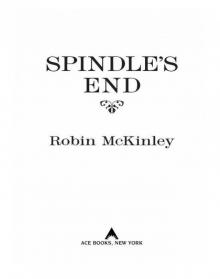 Spindle's End
Spindle's End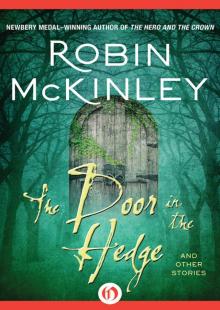 The Door in the Hedge: And Other Stories
The Door in the Hedge: And Other Stories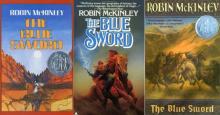 The Blue Sword
The Blue Sword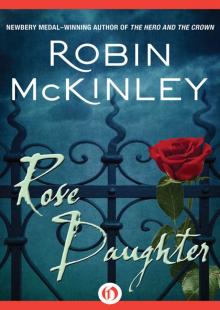 Rose Daughter
Rose Daughter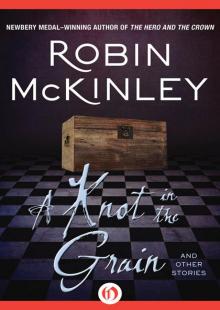 A Knot in the Grain and Other Stories
A Knot in the Grain and Other Stories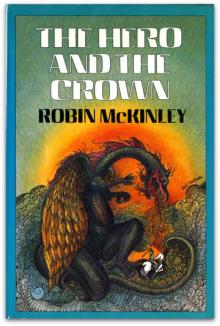 The Hero And The Crown
The Hero And The Crown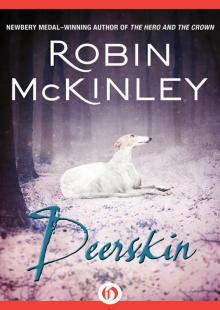 Deerskin
Deerskin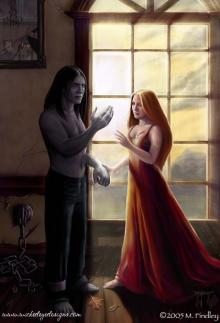 Sunshine
Sunshine Beauty: A Retelling of the Story of Beauty and the Beast
Beauty: A Retelling of the Story of Beauty and the Beast Shadows
Shadows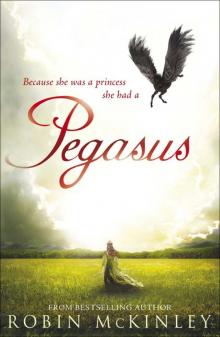 Pegasus
Pegasus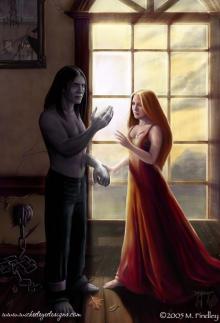 Chalice
Chalice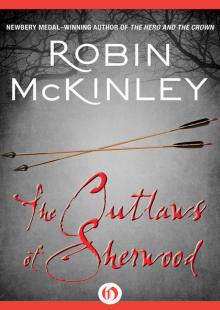 The Outlaws of Sherwood
The Outlaws of Sherwood Fire: Tales of Elemental Spirits
Fire: Tales of Elemental Spirits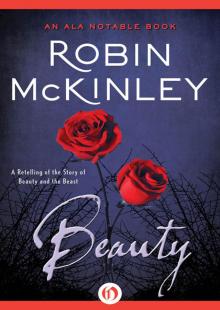 Beauty
Beauty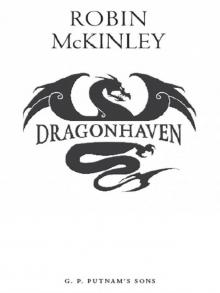 Dragon Haven
Dragon Haven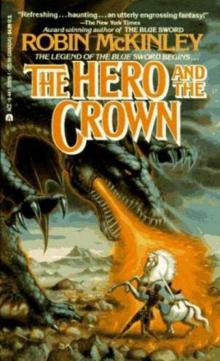 The Hero And The Crown d-2
The Hero And The Crown d-2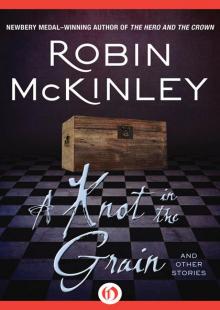 A Knot in the Grain
A Knot in the Grain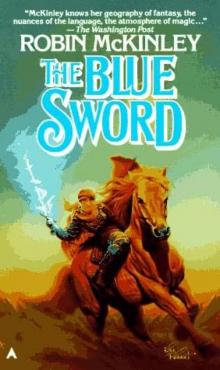 The Blue Sword d-1
The Blue Sword d-1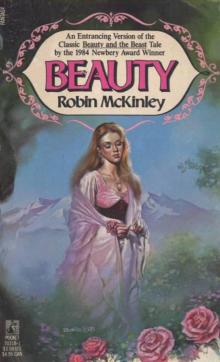 Beauty (v1.2)
Beauty (v1.2)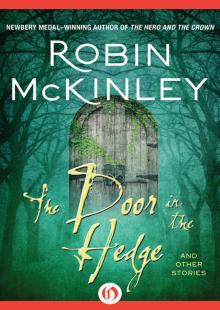 The Door in the Hedge
The Door in the Hedge